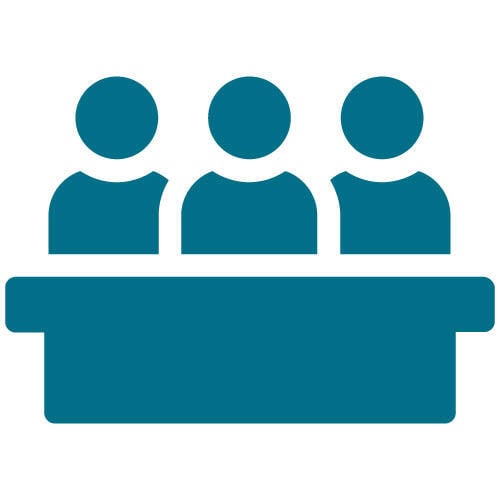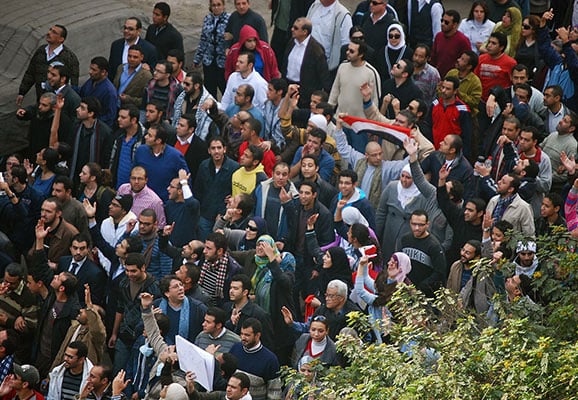COP27: Obstacles to Advocacy in Egypt
A Civic Space Explainer for Participants
PUBLISHED: OCTOBER 2022
The Egyptian government has a range of laws to target dissent, and authorities have not hesitated to use them. In recent years, the government has imprisoned activists, journalists, lawyers, researchers, and other members of civil society, along with tens of thousands of other Egyptians. As a result, it is nearly impossible to participate in advocacy activities perceived as contrary to the government’s interests without risking severe criminal consequences.
When preparing for activities around the 2022 UN Climate Change Conference (COP27) in Sharm El Sheikh or elsewhere in Egypt, individuals and organizations should be aware of the following:

Restrictions on Expression and Protest
Authorities frequently use laws with vaguely defined offenses and extreme criminal penalties to chill and punish advocacy online and off. Restrictive laws and repressive government practices severely curtail the right to free expression, assembly, and peaceful protest in Egypt.
PROHIBITIONS ON “FAKE NEWS”
Article 102 of the Penal Code prohibits the “spreading of fake news” if it “harms the public interest,” while the Law Regulating the Press, Media, and the Supreme Council for Media Regulation (Law 180 of 2018), criminalizes its spread by journalists or anyone with more than 5,000 followers on social media. Neither law defines “fake news,” and offenses may be punished by up to 15 years in prison. Examples include:
- Rights advocate Amal Fathy was sentenced to two years in prison for “spreading fake news” after she posted a Facebook video criticizing the lack of government action to address sexual harassment in Egypt.
- Scores of rights activists, journalists, bloggers, and others have been detained under “fake news” charges. In many cases, authorities circumvent limits on pre-trial detention to keep detainees imprisoned for years.
COUNTERTERRORISM LEGISLATION
These include provisions of the Penal Code, the Law on Confronting Terrorism (Law 94 of 2015), and the Law on Designation of Terrorist Entities (Decree-Law 8 of 2015). Often used alongside “fake news” prohibitions, counterterrorism laws define terrorist activity extremely broadly and can cover advocacy deemed to “disturb public order” or “harm national unity.” Penalties include lengthy prison sentences. Examples include:
- Human rights lawyer Hoda Abdel Moneam has spent over four years in pre-trial detention for charges, including joining a terrorist organization, after working with a rights group to expose state torture and forced disappearance cases.
- According to rights groups, between 2013 and 2020, some 11,700 people in Egypt were charged with terrorism offenses—the vast majority unrelated to violent extremism.
PROTEST AND PUBLIC ASSEMBLY LAWS
These include the Law Organizing the Right to Public Meetings, Processions, and Peaceful Protests (Law 107 of 2013) and the Law on Public Assemblies (Law 10 of 1914). Spontaneous protests are prohibited, and protesting without properly notifying authorities is punishable by imprisonment. The laws also enable security forces to use excessive and lethal force to disperse protesters. In addition, protesters face prison time and steep fines for committing vaguely defined offenses such as “violating public order” or “impeding public interests.” Examples include:
- In practice, the government has forcefully dispersed protests and made mass arrests of protesters and bystanders. For example, in the fall of 2020, amidst anti-government demonstrations across the country, authorities arrested nearly 1,000 protesters, including dozens of children.
- Authorities regularly charge protesters with laws that carry more severe penalties, like the counterterrorism and “fake news” laws discussed above.

Constraints on Advocacy Organizations
Egyptian law limits the formation, funding, and operations of organizations.
CIVIL SOCIETY ORGANIZATIONS LAW
The Law on the Exercise of Civil Work (Law 149 of 2019) requires all organizations to submit to an arduous, confusing registration process. Unregistered organizations are banned. Organizations that the government allows to register are subject to heavy supervision. Additionally, the law prohibits organizations from engaging in advocacy that authorities deem “political” or damaging to “public order” or “public morals.”
RESTRICTIONS ON FUNDING
Laws targeting organizations’ funding have chilled advocacy by allowing the government to cut off resources to disfavored groups. Law 149 allows the government to ban any funding from outside Egypt, while Articles 78 and 98 of the Penal Code prohibit the receipt of foreign funding with the intent to harm the “national interest,” “national sovereignty,” or “public peace.” Violators can face the death penalty.
Authorities have prosecuted dozens of civil society groups for receiving foreign grants and donations. As a result, members of the organizations have been banned from traveling and had their assets frozen.

Other Obstacles to Advocacy
REPRISALS FOR INTERNATIONAL ADVOCACY
The government has repeatedly targeted civil society members who engage with international actors. Examples include:
- Egyptian Initiative for Personal Rights staff were arrested days after conducting a human rights briefing for a group of foreign diplomats.
- Rights defender Ebrahim Metwally was arrested on his way to Switzerland for a meeting with the UN Working Group on Enforced Disappearances.
RESTRICTIONS ON FIELD RESEARCH
Law 149 restricts organizations’ ability to do research, a critical tool for effective advocacy. Under the law, organizations must obtain government approval before conducting or publishing surveys or opinion polls. In practice, groups say the necessary permits are almost impossible to get.
LIMITS ON ACCESS TO INFORMATION
Under the Law on Combating Cyber and Information Technology Crimes (Law 175 of 2018), the government can censor and block news outlets, social media platforms, and blogs and criminalize content. Since 2017, Egypt has blocked approximately 700 websites, including many independent news outlets. The government has also imprisoned dozens of journalists, making Egypt the third worst jailer of journalists in the world.
For more information, please reach out to us at mena@icnlalliance.org.
بيان الحيز المدني للمشاركين في مؤتمر تغير المناخ (مؤتمر الأطراف 27 – COP27)
تبنت الحكومة المصرية مجموعة من القوانين لاستهداف المعارضين، ولم تتردد السلطات في استخدامها. في السنوات الأخيرة ، سجنت الحكومة ناشطين وصحفيين ومحامين وباحثين وأعضاء آخرين في المجتمع المدني، إلى جانب عشرات الآلاف من المصريين الآخرين. نتيجة لذلك، فإنه يكاد يكون من المستحيل المشاركة في أنشطة المناصرة التي يُنظر إليها على أنها تتعارض مع مصالح الحكومة دون المخاطرة بالتعرض لعواقب جنائية وخيمة.
أثناء التحضير للأنشطة حول مؤتمر الأمم المتحدة لتغير المناخ 2022 (COP27) في شرم الشيخ أو في أي مكان آخر في مصر، فإنه ينبغي أن يكون الأفراد والمنظمات على بينة بشأن ما يلي:

القيود على التعبير والاحتجاج
تستخدم السلطات في كثير من الأحيان قوانين تنص على جرائم غامضة التعريف وعقوبات جنائية مشددة لكبح ومعاقبة المناصرة عبر شبكة الإنترنت وخارجها. القوانين التقييدية والممارسات الحكومية القمعية تحد بشدة من الحق في حرية التعبير والتجمع والاحتجاج السلمي في مصر.
حظر “الأخبار الكاذبة”
تحظر المادة 102 من قانون العقوبات “نشر أخبار كاذبة” إذا كانت “تضر بالمصلحة العامة”، في حين يجرّم قانون تنظيم الصحافة والإعلام والمجلس الأعلى لتنظيم الإعلام (قانون رقم 180 لسنة 2018) نشرها من قبل الصحفيين أو أي شخص لديه أكثر من 5,000 متابع على وسائل التواصل الاجتماعي. لا ينص أياً من القانونين على تعريف “الأخبار الكاذبة”، وقد يُعاقب على الجرائم بالسجن لمدة تصل إلى 15 عاماً.
- حُكم على المدافعة عن حقوق الإنسان أمل فتحي بالسجن لمدة عامين بتهمة “نشر أخبار كاذبة” بعد أن نشرت مقطع فيديو على فيسبوك تنتقد فيه عدم اتخاذ الحكومة إجراءات للتصدي للتحرش الجنسي في مصر.
- تم اعتقال العشرات من الناشطين الحقوقيين والصحفيين والمدونين وغيرهم بتهم “الأخبار الكاذبة”. في كثير من الحالات، تتحايل السلطات على القيود المفروضة على الاحتجاز على ذمة المحاكمة لإبقاء المحتجزين في السجن لسنوات.
تشريعات مكافحة الإرهاب
تشمل هذه التشريعات أحكام قانون العقوبات، وقانون مكافحة الإرهاب (قانون رقم 94 لسنة 2015)، وقانون تنظيم قوائم الكيانات الإرهابية والإرهابيين (مرسوم بقانون رقم 8 لسنة 2015). غالباً ما تُستخدم قوانين مكافحة الإرهاب بموازاة حظر “الأخبار الكاذبة”، وهي تُعرِّف النشاط الإرهابي بشكل فضفاض ويمكن أن تشمل المناصرة التي يُنظر إليها على أنها “تخل بالنظام العام” أو “تضر بالوحدة الوطنية”. تشمل العقوبات أحكاماً بالسجن لآماد طويلة.
- أمضت المحامية الحقوقية والنائبة السابقة هدى عبد المنعم أكثر من أربع سنوات في الحبس الاحتياطي بتهم من بينها الانضمام إلى منظمة إرهابية.
- وفقاً للجماعات الحقوقية، فإنه بين عامي 2013 و 2020 تم اتهام حوالي 11,700 شخص في مصر بارتكاب جرائم إرهابية – معظمها لا علاقة لها بالتطرف العنيف.
القوانين المتعلقة بالتظاهرات والتجمعات العامة
تشمل هذه القوانين قانون تنظيم الحق في الاجتماعات العامة والمواكب والتظاهرات السلمية (قانون رقم 107 لسنة 2013) وقانون التجمعات العامة (قانون رقم 10 لسنة 1914). التظاهرات العفوية محظورة، ويُعاقب على التظاهر دون إخطار السلطات حسب الأصول بالسجن. أيضاً، تجيز القوانين لقوات الأمن باستخدام القوة المفرطة والمميتة لتفريق المتظاهرين. بالإضافة إلى ذلك، فإن المتظاهرين عرضة لعقوبة السجن والغرامات الباهظة لارتكاب جرائم غامضة التعريف مثل “الإخلال بالنظام العام” أو “تعطيل المصالح العامة”.
- عملياً، فرقت الحكومة بقوة التظاهرات وقامت باعتقالات جماعية للمتظاهرين والمارة. على سبيل المثال، في خريف عام 2019، وسط مظاهرات مناهضة للحكومة في جميع أنحاء البلاد، اعتقلت السلطات ما يقرب من 1,000 متظاهر، من بينهم عشرات الأطفال.
- توجه السلطات بانتظام اتهامات للمتظاهرين وفقاً للقوانين التي تنطوي على عقوبات أشد، مثل قوانين مكافحة الإرهاب و “الأخبار الكاذبة” التي تمت مناقشتها أعلاه.

القيود على منظمات المناصرة
يفرض القانون المصري قيوداً على تكوين وتمويل وعمليات المنظمات.
قانون منظمات المجتمع المدني
يشترط قانون ممارسة العمل المدني (قانون رقم 149 لسنة 2019) على جميع المنظمات الخضوع لعملية تسجيل شاقة ومربكة. المنظمات غير المسجلة محظورة. المنظمات التي تسمح الحكومة بتسجيلها تخضع لرقابة مشددة. بالإضافة إلى ذلك، يحظر القانون على المنظمات الانخراط في المناصرة التي تعتبرها السلطات “سياسية” أو مضرة “بالنظام العام” أو “الآداب العامة”.
- تم إغلاق الشبكة العربية لمعلومات حقوق الإنسان، وهي منظمة حقوقية رائدة، في يناير 2022 بعد 18 عاماً من العمل، بذريعة عدم قدرتها على ممارسة العمل الحقوقي بموجب القانون رقم 149.
القيود على التمويل
أدت القوانين التي تستهدف تمويل المنظمات إلى كبح المناصرة من خلال السماح للحكومة بقطع الموارد عن المجموعات غير المرغوب فيها. يجيز القانون رقم 149 للحكومة حظر أي تمويل من خارج مصر، في حين تحظر المادتان 78 و 98 من قانون العقوبات تلقي التمويل الأجنبي بقصد الإضرار “بالمصلحة الوطنية” أو “السيادة الوطنية” أو “السلم العام”. يمكن أن يواجه المخالفون عقوبة الإعدام.
- قامت السلطات بملاحقة العشرات من منظمات المجتمع المدني قضائياً بتهمة تلقي منح وتبرعات أجنبية. نتيجة لذلك، مُنع أعضاء المنظمات من السفر وتم تجميد ممتلكاتهم.

المعوقات الأخرى أمام المناصرة
الإجراءات الانتقامية إزاء المناصرة الدولية
استهدفت الحكومة مراراً أعضاء المجتمع المدني الذين ينخرطون مع جهات دولية.
- تم اعتقال طاقم المبادرة المصرية للحقوق الشخصية بعد أيام من تقديمهم إحاطة عن حقوق الإنسان أمام مجموعة من الدبلوماسيين الأجانب.
- تم اعتقال المدافع عن حقوق الإنسان إبراهيم متولي وهو في طريقه إلى سويسرا لحضور اجتماع مع فريق الأمم المتحدة العامل المعني بحالات الاختفاء القسري.
القيود على البحوث الميدانية
يفرض القانون رقم 149 قيوداً على قدرة المنظمات على إجراء البحوث، والتي تُعد أداة حاسمة للمناصرة الفعالة. بموجب القانون، فإنه يجب على المنظمات الحصول على موافقة الحكومة قبل إجراء أو نشر المسوحات أو استطلاعات الرأي. من الناحية العملية، تتحدث المجموعات عن أنه يكاد يكون من المستحيل الحصول على التصاريح اللازمة.
القيود على الوصول إلى المعلومات
بموجب قانون مكافحة جرائم الإنترنت وتقنية المعلومات (قانون رقم 175 لسنة 2018)، فإنه يجوز للحكومة أن تفرض الرقابة والحظر على وسائل الإعلام ومنصات التواصل الاجتماعي والمدونات، بالإضافة إلى تجريم المحتوى.
- منذ عام 2017، حظرت مصر ما يقرب من 700 موقع إلكتروني، بما في ذلك العديد من وسائل الإعلام المستقلة. كما سجنت الحكومة عشرات الصحفيين، مما جعل مصر ثالث أسوأ دولة تسجن الصحفيين في العالم.
للمزيد من المعلومات، يُرجى التواصل معنا على البريد الإلكتروني mena@icnlalliance.org.
Sign up for our newsletters
Sign up
